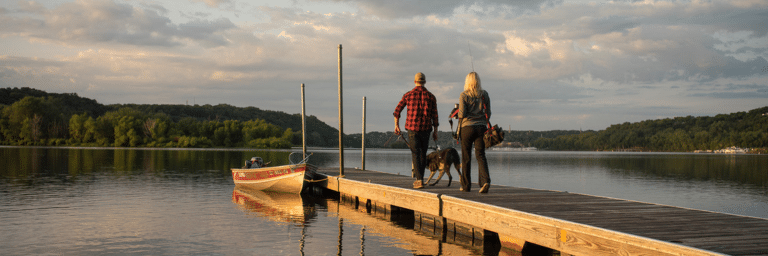SPRING BOATING
Early Spring Fishing Tips
Most anglers yearn for spring when the ice has receded from the lake and they can get back on the water to visit favourite fishing holes. If you are like most and start your fishing early, here are a few tips to make sure that you don’t get caught by an unexpected breakdown or emergency on the water.
1. Safety Equipment
Start by reloading all your safety equipment onto the boat making sure that each piece is in proper working order and that all powered equipment have fresh batteries. You can minimize the chance of getting stranded out on the water by ensuring that all systems on the boat are mechanically sound and that the gas tank is full with fresh gas before heading out. If you have a boat with external gas tanks, having a spare full tank on hand is a sound practice.
2. Weather
In spring, the weather can change quickly so be sure to check the (marine) forecast before you go and be familiar with you and your boat’s weather limitations. And don’t be fooled by balmy spring breezes into dressing in light clothing. The water is still very cold and has a large influence in the air temperature above it, so be prepared with warm thermal protective clothing so you won’t be cutting your time on the water short.
3. Marine Radio
A key piece of safety equipment is a marine radio. With a VHF radio you have a means of direct contact with a Coast Guard Search and Rescue Center. Your distress message will also be picked up by other vessels of convenience who may be in a position to provide assistance close at hand. And before departing, tell a reliable person where you are going, when you expect to return and the number to call if you not return as scheduled.
The operation of a marine radio requires the possession of at least a Restricted Operator Certificate-Maritime (ROC-M). CanBoat offers courses for VHF Radio operation and the exam to obtain your ROC-M. In this course you will learn uses of marine radios, choice of frequencies, channel selection, operation, phonetic alphabet, procedural words and phrases, as well as Digital Selective Calling and the Global Maritime Distress and Safety System, (DSC/GMDSS) and how to call for help in an emergency.
Register for a Maritime Radio course at: www.boatingcourses.ca. Classes are available online or in-person. Study guide, exam and certificate are included.
4. Wear Your Lifejacket
As you head out, be sure to wear your lifejacket. The water is cold and the shock you may experience with an unexpected fall, could hamper your ability to swim or even simply catch your breath. A lifejacket will give you the necessary time to sort things out and the time to rescue yourself. Plus with the number of styles available today, some specifically designed for anglers, there really is no reason not to wear one.
5. Re-boarding Device
And if you do end up in the water, have a way to get back in your boat unassisted. It can be as simple as tying a 4 or 5 foot loop of rope to a cleat and coiled just inside the boat. Make sure that you can reach it from the water to use it as a step to get back into your boat.
Watch:
Spring is a great season for fishing and, with a little preparation, you can enjoy it safely so you can concentrate on what’s important.
Courtesy of: The Canadian Safe Boating Council with additions from CanBoat.
